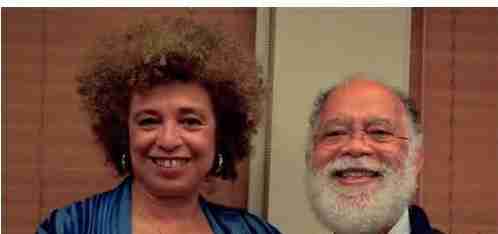John R. Rickford with renowned activist Angela Davis.
By MOHAMED HAMALUDIN
A world-renowned Stanford linguistics professor whose academic defense of prosecution witness Rachel Jeantel after the trial of George Zimmerman drew wide interest has been elected to member ship in the American Academy of Arts and Sciences.
John R. Rickford has argued that jurors and the media contributed to the acquittal of Zimmerman, who was on trial in 2013 for killing Trayvon Martin, by disregarding and disbelieving Jeantel’s crucial testimony because of the strong African American vernacular she used as the prosecution’s star witness.
But Rickford, who, with a Stanford student, wrote an award-winning paper on Jeantel’s use of African American Vernacular English (AAVE), also known as Ebonics, has said that Jeantel was “fluent in a variety of English that’s been in existence for centuries.”
The problem, he says, is that, unlike what happens with witnesses with a foreign language background, no effort was made to provide an interpreter for Jeantel so her testimony could be translated into “Standard English.”
The upshot was that Jeantel was vilified on social media and the press for her language, even though it was systematic and well formed. [JR1] Juror B37 even said on television she did not understand her or find her credible.
There is a lesson in Jeantel’s experience, Rickford said, in that “we don’t know how many people are behind bars because of negative perceptions and inability to grasp the vernacular.” Another lesson is that refusal to accord a place to the vernacular, even as a basis for Contrastive Analysis to teach Standard or Mainstream English, is a prime reason for educational failure among AAVE and other dialect-speaking communities.
Experiments using Contrastive Analysis have been much more successful than the conventional method of ignoring or castigating the vernacular.
Rickford, who joined the Stanford faculty in 1980, has been focusing his attention over the last quarter century to illustrating, through several books and a large number of papers, the systematicity and resources of Creole and Vernacular English, from wherever it comes – the Caribbean or the United States.
His overall objective, he said in a phone interview Tuesday, is to stop discrediting and belittling non-standard English and, instead, use it as a means of developing versatility in “Standard English” and other varieties.
Rickford disclosed that he has been in contact with some members of the School Board of Miami-Dade County and may someday hold workshops with teachers in Miami along these lines, along with his wife Angela, a literacy professor at San Jose State University. He would seek to “build bridges between the vernacular and Standard English” and she would tackle reading.
“I find Miami to be a fascinating place, because of the wide variety of people from many places who speak different languages (e.g. Spanish, Haitian Kreyol) and varieties of Creole and Vernacular English. This richly multilingual and multicultural area fits well within my field of interest. I have been interested, increasingly since the 1990s, in how sociolinguistic research can be applied to help us understand and overcome the challenges that vernacular and Creole speakers face in schools, where standard/mainstream varieties are expected.”
Rickford, who was born in Georgetown, the Guyana capital, credits his academic successes to caring but stern parents and teachers since grade schools. His interest in linguistics came when he began attending the University of California at Santa Cruz in 1968 on a US scholarship and came into contact with the works of noted linguists and anthropologists, including Roger Keesing and Robert B. LePage, who worked on Solomon Islands Pidgin English and Jamaican Creole.
He taught Linguistics at the University of Guyana, where he was also Vice Dean of the Faculty of Arts., before joining the Stanford faculty in the early 1980s, where he is the J.E.
Wallace Sterling Professor of Linguistics and the Humanities at Stanford University.
The American Academy of Arts and Sciences, which invited Rickford to become a member, was charted in 1780, according to its website.
Members have included historian John Hope Franklin, civil rights icon Martin Luther King Jr. and human rights stalwart Nelson Mandela, along with several other distinguished men and women, including more than 250 Nobel and Pulitzer Prize winners.
“This honor signifies the high regard in which you are held by leaders in your field and members throughout the nation,” the Academy’s chairman Don M. Randel and president Jonathan F. Fanton told Rickford in their letter announcing he was picked to join the AAAS.
Rickford told South Florida Times he was both exhilarated and humbled by his election to the Academy, which will induct him in October.
“It was very moving and very humbling,” he said. “I don’t take it to mean that I am outstanding but that I am fortunate to be so recognized by my colleagues.”










No Comment